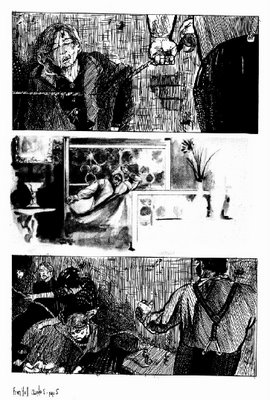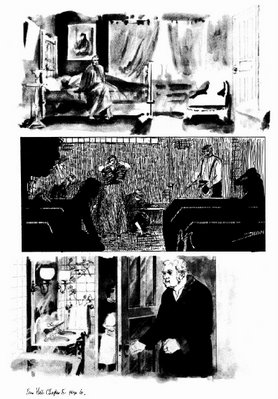 “Nothing is what it seems” is the tired tagline for Neil Burger’s The Illusionist, which I saw on DVD recently. I should have been warned. This disappointingly static film is capped by a surprise ending which shows us that nothing, indeed, was as it seemed. In a story about illusions and the fine art of deception, this shouldn’t come as a big surprise at all – but it’s done in a way that shows up much of the movie as lazy gimmickry.
“Nothing is what it seems” is the tired tagline for Neil Burger’s The Illusionist, which I saw on DVD recently. I should have been warned. This disappointingly static film is capped by a surprise ending which shows us that nothing, indeed, was as it seemed. In a story about illusions and the fine art of deception, this shouldn’t come as a big surprise at all – but it’s done in a way that shows up much of the movie as lazy gimmickry.I’m wary of twists in a film’s tail. Too often this device works only at one level – creating a shiver of excitement in the first-time viewer – and at the expense of the internal logic created in the rest of the film. Classic example: Bryan Singer’s overrated The Usual Suspects, where the final revelation (conveyed through the responses of a character whose shock mirrors the viewer’s) became an end in itself – two minutes of cleverness making nonsense of the 90 minutes that preceded them. (Besides, watching the film again, you realise how vapid those 90 minutes were in the first place.)
One twist that worked for me was the one at the end of M Night Shyamalan’s Unbreakable (which I’ve blogged about here) because it brought the film’s themes into clearer focus and helped the viewer appreciate things about the central characters that we hadn’t been able to see until that point. But such examples are rare, and the surprise at the end of The Illusionist doesn’t enrich the film in any way.
Burger's film, set in late 19th century Austria, is great to look at and begins promisingly. The driving force is an early scene where Eisenheim, a carpenter’s son, is hiding in a secret room with Sophie, a young duchess; they have become close friends and this is frowned upon in her social circles. “Make us disappear!” Sophie urges him as her wards closes in on the hiding place. Eisenheim is an amateur conjurer but this feat is quite beyond him, and the two of them are discovered and separated.
 Fifteen years later Eisenheim returns to Vienna; he calls himself the Illusionist now, and he’s played by Edward Norton with a gaze that’s so fixed and so intense you’d think he was trying to keep from dissolving into peals of laughter. Meanwhile Sophie has grown into Jessica Biel, and worse things could happen to a young Duchess, but she isn’t very happy – she’s engaged to Crown Prince Leopold (Rufus Sewell), an unsmiling throne-hankerer with “a reputation for beating up his women”. Rounding off the main cast of characters is Chief Inspector Uhl (Paul Giamatti), an intrigued witness to the mindgames that ensue as Eisenheim casts a spell over the city and renews his relationship with Sophie. His illusions begin with relatively pedestrian things like growing an orange tree out of a seed in a few moments (“the mysteries of time and space may be unlocked. Nature’s laws may be bent”) – but soon he starts invoking otherworldly spirits and raising questions about supernatural powers.
Fifteen years later Eisenheim returns to Vienna; he calls himself the Illusionist now, and he’s played by Edward Norton with a gaze that’s so fixed and so intense you’d think he was trying to keep from dissolving into peals of laughter. Meanwhile Sophie has grown into Jessica Biel, and worse things could happen to a young Duchess, but she isn’t very happy – she’s engaged to Crown Prince Leopold (Rufus Sewell), an unsmiling throne-hankerer with “a reputation for beating up his women”. Rounding off the main cast of characters is Chief Inspector Uhl (Paul Giamatti), an intrigued witness to the mindgames that ensue as Eisenheim casts a spell over the city and renews his relationship with Sophie. His illusions begin with relatively pedestrian things like growing an orange tree out of a seed in a few moments (“the mysteries of time and space may be unlocked. Nature’s laws may be bent”) – but soon he starts invoking otherworldly spirits and raising questions about supernatural powers.There’s enough here to suggest that The Illusionist could have been a really good film. The early scenes, especially the sepia-tinted flashbacks of Eisenheim’s childhood, are very striking; in fact the cinematography and art-direction are beautiful throughout. But the producers failed to pull a scriptwriter out of their hat. There’s plenty of solemn talk alright, and a few cryptic exchanges (especially between Eisenheim and Inspector Uhl) that sound like they might mean something, but none of it leads anywhere. Initially you think the dialogue is stilted because maybe this is just how these 19th century types talk to each other – but any such fancies disappear with scene after scene of posturing and clumsy humour.
Rarely does a bad script produce decent performances, however accomplished the actors, and Ed Norton never seems to get a grip on Eisenheim; his performance consists almost entirely of that intense gaze and the occasional raising of his hand to his head to simulate deep concentration. Jessica Biel apparently did this film to prove she could be a serious actress, but “serious” here is a synonym for “English-accented”. (Just by the by, why do we need to hear turn-of-the-century Austrians speaking in Oxford accents? Once it was decided that this would be an English-language film, the suspension of disbelief was already in place; so couldn’t Norton, Giamatti and Biel have been allowed to retain their American accents? Unless the idea was to make sure the actors earned their wages, given that their lines are so undemanding.)
I was also put off by the way the film copped out at key moments: there are early indications, for instance, that some of Eisenheim’s tricks will be explained, but all we get is a quick glimpse of a notebook with elaborate marked diagrams on it. And there are hints but no real exploration of the possibility that Eisenheim’s secrets might be connected with the “magic” of cinema’s early years (The Illusionist is set at a time when pioneers like Georges Méliès were astonishing audiences with their moving pictures, and when the line between science and the supernatural must have become very blurred).
Pity. With a more thoughtful, wittier screenplay and a better-developed exposition, this could have been a much more satisfying film.
P.S. Anthony Lane once said of the cardboard villains in Con Air that the more the film broadcast their wickedness, the more unbelievable and funny it became. It occurs to me that similar logic applies to movie twists. When you see a goggle-eyed character experience a moment of epiphany (whether it’s Bruce Willis staggering about in astonishment as he realises that he’s been dead for years, Chazz Palminterri coming to the chilling conclusion that Verbal Kint is Keyser Soze, or Paul Giamatti discovering an elaborate conspiracy in The Illusionist), the whole thing is just too earnest to be taken seriously. It’s as if the film is banging you over the head with a signboard that says “Payoff time! Here’s the Twist! Be Surprised!” And you’re too busy rolling in the aisles to notice.













